The latest post in my series all about Water Bath Canning discusses the special ingredients you need in addition to your Water Bath Canning Equipment and Supplies.
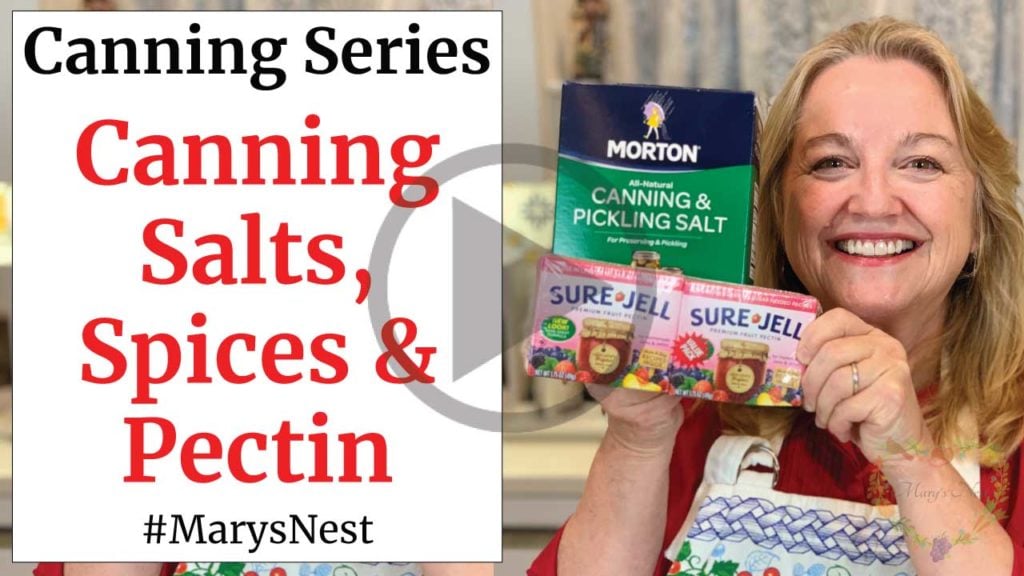
Affiliates note: As an Amazon Associate I earn from qualifying purchases. My content may contain affiliate links to products and services. If you click through and make a purchase, I’ll receive a small commission. It does not affect the price you pay.
Table of Contents
Salts For Water Bath Canning
Once you decide on a recipe that you want to make and process in a water bath canner, you may find that the recipe calls for salt. But it’s not going to be just any salt. You will need canning or “pickling” salt. Why? Because when it comes to home canning, standardization is the key to success, and canning salts are standardized. But don’t worry. Canning salts are not hard to find, and they are generally sold in most grocery stores and large “big box” stores.
Flexibility When It Comes to Spices
When it comes to the type of spices that you may want to use in your canned foods, you have a lot of choices. You can certainly buy the prepared spice mixes sold along with the canning salts and other supplies, but it’s not required. You can use any spice or spice mixes that you want.
Which Pectin To Choose?
As you start water bath canning, and you decide to try your hand at making homemade jams, jellies, and marmalades, you’ll need to learn about pectin. The common question is…do I need to buy pectin? And the answer is no.
You can make jams and more without using commercially prepared pectin. The process is a bit different than if you are using purchased pectin, and you can learn all about this process in the video where I show you How to Make a Three Citrus Marmalade.
If you want the jam-making process to go quicker and decide to buy pectin, there are generally two kinds:
- Powdered pectin
- Liquid pectin
Both pectins offer similar results, and the choice boils down to which type you like using. As you make more jams, jellies, and marmalades, you will begin to discover which type of pectin you like best and which one works best in the recipes you choose.
What About Lemon Juice?
As we discussed in the Essential Guide to Water Bath Canning Equipment and Supplies, you use the water bath technique to can tomatoes, but most recipes will call for adding extra acid to your canning jar. Generally, you should use bottled lemon juice, as opposed to fresh, because just like tomatoes that contain an uncertain and variable acid level, the level of acidity of the juice from a fresh lemon can be unpredictable too.
But not to worry. Bottled lemon juice is usually very easy to find at most grocery stores. And as a backup, you can use a bit of powdered citric acid, and this powdered acid is usually sold in the same place as the other canning supplies.
More Water Bath Canning Videos
Now that you know about the Water Bath Canning Salts, Spices, and Pectin, learn about Water Bath Canning Books, as well as Water Bath Canning Supplies and Equipment. I also show you how to make Low-Sugar Strawberry Jam and a Marmalade Jam with a step-by-step guide to water bath canning both. Lastly, you’ll find videos for canning crushed tomatoes and a Ball Electric Water Bath Canner unboxing.

Order YOUR COPY Now!
The Modern Pioneer Pantry
Simple ingredients, timeless techniques, and a well-stocked pantry. Discover over 100 nourishing recipes to preserve food and turn pantry staples into delicious, homemade meals. Build a wholesome, traditional pantry—just like a modern pioneer!
Download Your Free 36-Page Pantry List
For an extensive list of the traditional foods you can make and purchase to stock your pantry, be sure to download my free 36-page Traditional Foods Pantry List. This comprehensive eBook is full of links to recipe videos, helpful articles, and more!
And if you’re looking for a printed book full of my traditional foods recipes that shows you how to create a traditional foods kitchen, be sure to order your copy of my new bestselling book, The Modern Pioneer Cookbook. (My cookbook will help you get started water bath canning.)
Stay in Touch with Mary’s Nest
- Subscribe to My YouTube Channel for Traditional Foods Videos (Free) - When you subscribe, be sure to click on the notification bell that will let you know each time I upload a new video.
- Subscribe to Mary’s Traditional Foods Newsletter (Free) - Get a free 36-page eBook for signing up: How to Stock Your Essential Traditional Foods Four-Corners Pantry.
- Join the Traditional Foods Kitchen Academy - For more detailed videos and exclusive members-only perks, join my YouTube membership community.
- Order The Modern Pioneer Cookbook - Get a hardcover book of Mary's nourishing recipes from a Traditional Foods Kitchen. This bestselling cookbook is published by Penguin Random House with their DK imprint.
- Order The Modern Pioneer Pantry - Get Mary's latest hardcover cookbook about preserving food and making delicious meals from your Four Corners Pantry. Mary's second cookbook is also published by Penguin Random House.
I look forward to having you join me in my Texas Hill Country Kitchen!
Shop for items used in this blog post or video
Favorite Water Bath Canning Equipment
Favorite Water Bath Canning Supplies
- Canning Essentials Kit (includes debubbler)
- Canning Scoop/Ladle
- Canning Funnel with Head Space Markings
- Ball Quilted 12-ounce Jelly Jars with Lids and Bands
- Ball Regular Mouth Lids and Bands
- Ball Regular Mouth Pint 16-oz Mason Jar with Lids and Bands
- Ball Wide Mouth Jars 32-oz with Lids and Bands
- Secure Lift Jar Lifter
Amazon Shop and Shopping Guide
- Visit Mary’s Nest Amazon Shop
- Get a 30-day Audible trial with a free audiobook
- Visit my Shopping Guide page
Get up to 15% off for stocking your Traditional Foods Pantry and equipping your Modern Pioneer Kitchen, including discounts from US Wellness Meats, Farmhouse Teas, Backwoods Home, Masontops, Cultures for Health, Survival Garden Seeds, Redmond Real Salt, and More!
Favorite Water Bath Canning Books
- The Modern Pioneer Cookbook
- The Modern Pioneer Pantry
- Ball Canning Back to Basics
- USDA Complete Guide to Home Canning
- Ball Complete Book of Home Preserving
- The All New Ball Book Of Canning And Preserving
- Bernardin Guide to Home Preserving
- The River Cottage Preserves Handbook
- The Amish Canning Cookbook
- Preserving Today
- Jam On – The Craft of Canning Fruit
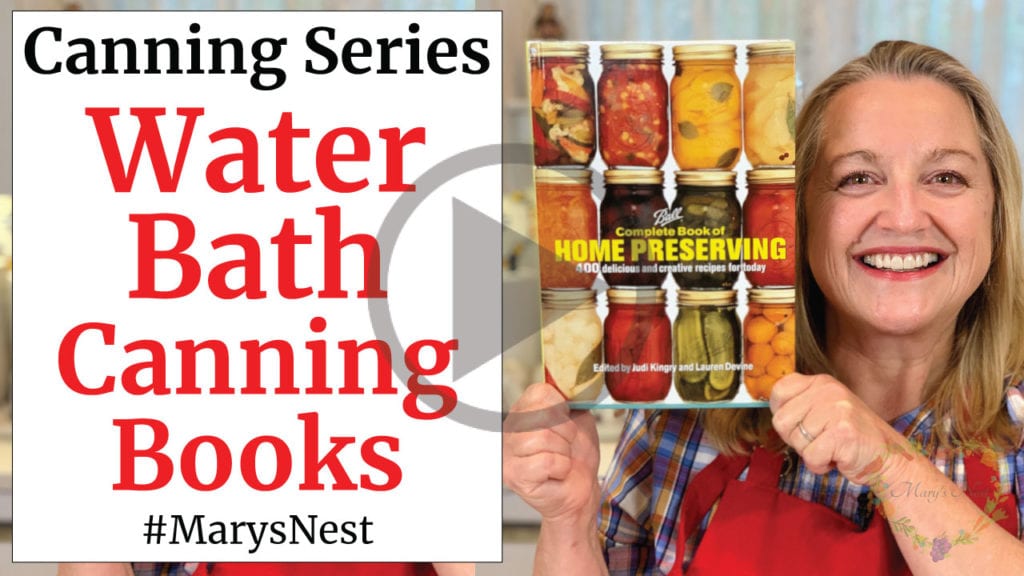
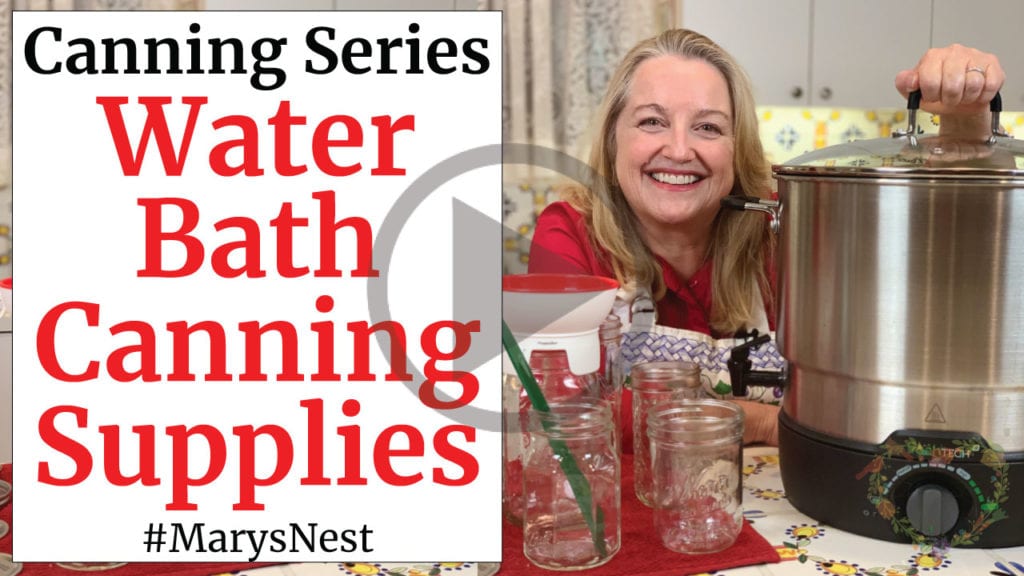
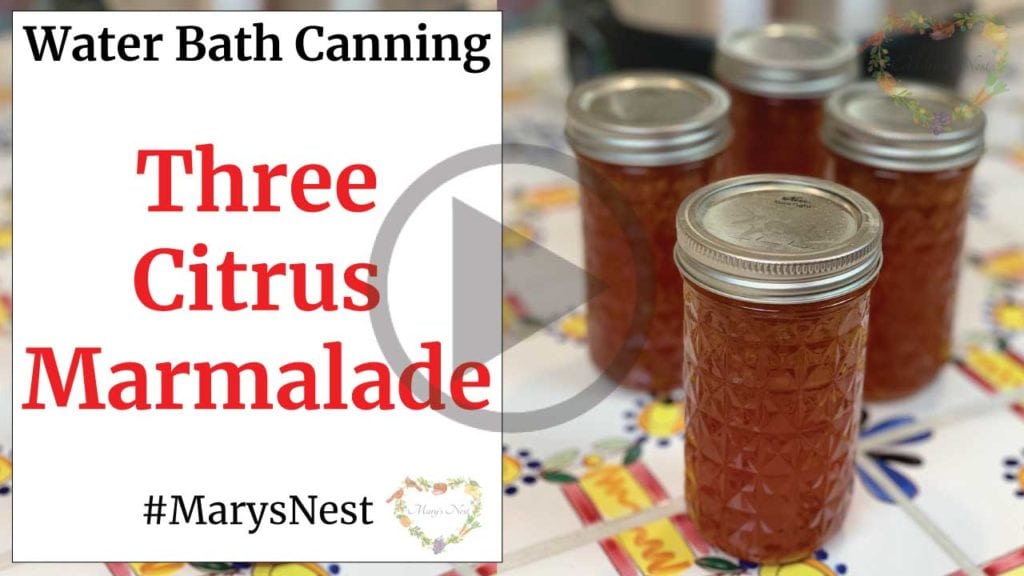
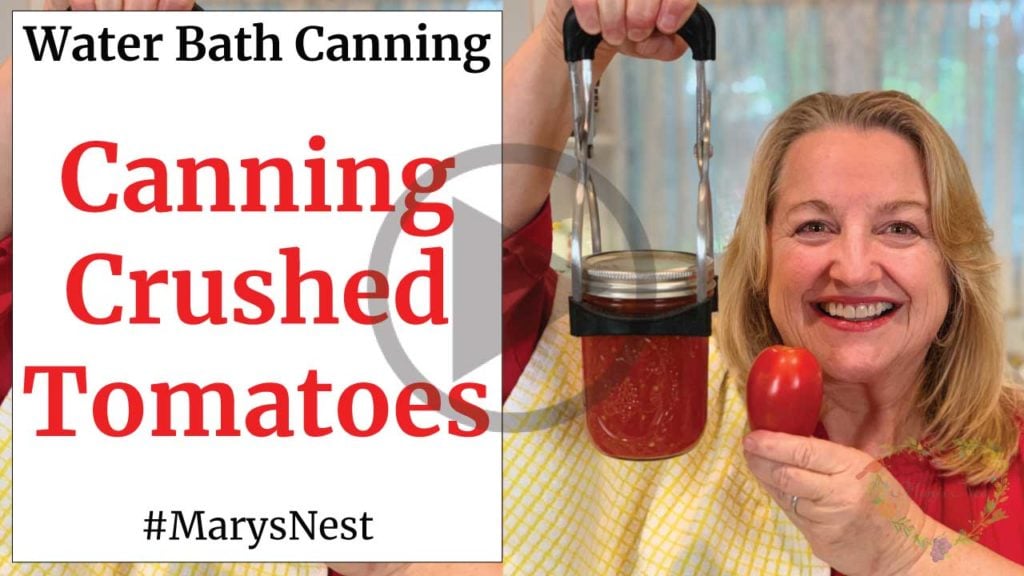
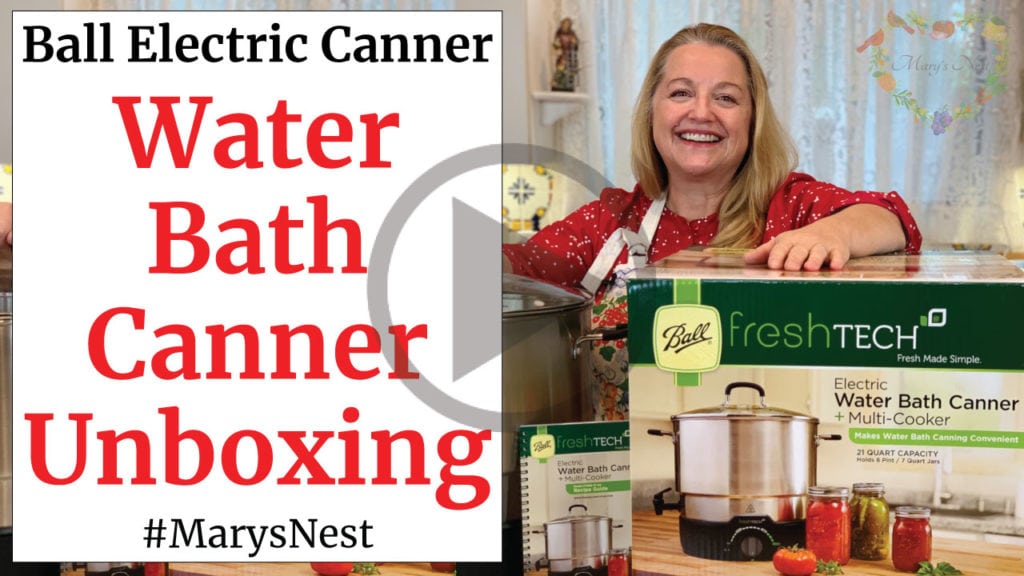


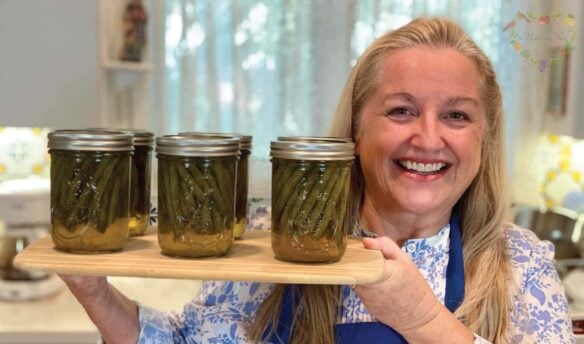


Hi, Mary,
Another quick question: I ordered a vacuum sealer for mason jars. Could I simply vac seal a jar of fermented sauerkraut?
Or is water bath canning best (or even an option)?
Thank you!
Hi Kira,
Thanks for your comment. I don’t recommend vacuum sealing sauerkraut. It’s not a proper food-safe practice. You’ll want to enjoy it while it’s still fresh and can give you its probiotic benefits.
I also don’t recommend water bath canning your sauerkraut. The heat during the canning process will destroy all the probiotic bacteria, and you’ll wind up with just some lifeless cabbage in a jar.
I hope this helps you.
Love and God bless,
Mary
Hi, Mary,
Thank you so much for your informative, educational, and very interesting videos. I have learned so much from your tutorials, and I am now keeping all kinds of tips and recipes in a big 3-ring binder for reference. I am 61, and for 25 years I homecooked our meals and tried my best to live naturally and simply as I cared for our three children and my wonderful husband. Now, however, I live alone, and I want to start ‘ramping’ up my homesteading skills to help my children and others. So, here is my question: Can I water-bath can fermented sauerkraut? I want to make a vitamin C rich dish like fermented sauerkraut, but I want to keep it in my long-term pantry. My children gave me a Ball kit for canning, and I have yet to try it (I’ve never canned). I look forward to hearing your answer! P.S.–I loved the video where you shared some Catholic background; I, too, am Catholic, and I live in Temple, not far from Georgetown. I hope you will keep helping people with your knowledge, and never give up! I will keep you and your wonderful family in my prayers!
Hi Kira,
Thanks so much for your kind comment. You were such a wonderful wife and mother to give homecooked meals to your family for 25 years, and you’re so kind to want to continue to help your children and others to eat and live more naturally.
Although you can water bath can many delicious recipes, I don’t recommend it for sauerkraut. The heat during the canning process will destroy all the probiotic bacteria, and you won’t enjoy all the benefits that fermented sauerkraut has to offer.
Instead, have you thought of making Homemade Rose Hips Syrup for long-term storage in your refrigerator? It will provide you with vitamin C and will last up to a year if you make it with honey. You can find the recipe at https://marysnest.com/homemade-rose-hips-syrup-recipe/
Thanks again for your wonderful comment. I’m glad you’re in the Central Texas area, and I’m especially glad we’re on this traditional foods journey together.
Love and God bless,
Mary